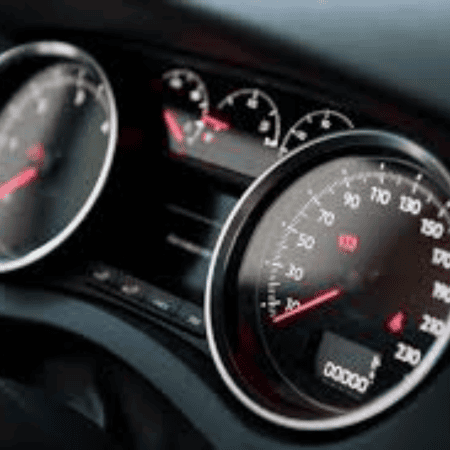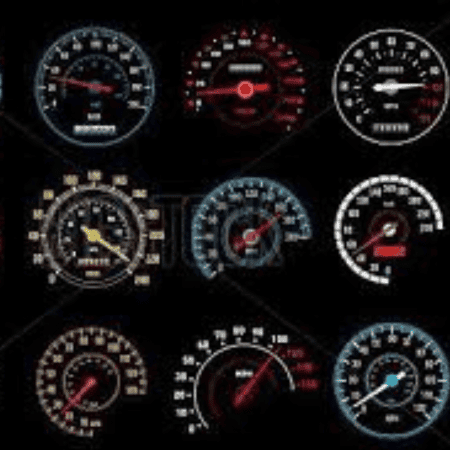Driving is a smooth and enjoyable experience until unexpected problems arise. Suddenly, you notice that all the gauges on your dashboard have stopped working, leaving you puzzled and concerned. This can be a stressful situation, but fear not, as there are steps you can take to address this issue and get back on the road safely. So keep on reading to know “Why all my gauges stopped working while driving?”
Why all my gauges stopped working while driving? While driving, you may find that all your gauges suddenly stop working. This could happen due to several reasons. One common cause could be a blown fuse, which disrupts the flow of electricity to the gauges.
Another possibility is a faulty wiring connection, which can cause a loss of communication between the gauges and the vehicle’s computer system. Sometimes, the issue may lie with the gauges themselves, such as a malfunctioning instrument cluster.
Whatever the cause, it’s essential to address this problem promptly as it can affect your ability to monitor important aspects of your vehicle while driving, like speed, fuel level, and engine temperature.
role of gauges in any vehicle
Gauges play a crucial role in any vehicle by providing essential information to the driver. These instruments help monitor various aspects of the vehicle’s performance and condition, such as speed, fuel level, engine temperature, and oil pressure.
By keeping an eye on these gauges, drivers can make informed decisions to ensure the safe and efficient operation of the vehicle. For example, the speedometer helps maintain safe driving speeds, while the fuel gauge indicates when it’s time to refuel.
Similarly, gauges like the temperature gauge and oil pressure gauge alert drivers to potential engine problems, allowing them to take corrective action before serious damage occurs. Overall, gauges are essential tools that contribute to the overall safety, efficiency, and reliability of any vehicle.

Must Read
signs of Gauges Malfunction
Signs of gauge malfunction in a vehicle include:
Inaccurate Readings: Gauges displaying incorrect information, such as a speedometer showing the wrong speed or a fuel gauge indicating an incorrect fuel level.
Total Failure: Complete non-functionality of all gauges on the instrument cluster, including speedometer, tachometer, fuel gauge, temperature gauge, and others.
Intermittent Issues: Gauges may work sporadically, functioning properly at times and then failing to operate at other times.
Dim or Flickering Displays: Dimming or flickering of gauge displays, indicating potential electrical issues affecting the instrument cluster.
Warning Lights: Activation of warning lights on the dashboard, such as the check engine light or battery warning light, which may indicate underlying problems with the gauges or the vehicle’s electrical system.
Causes of Gauges stopped working while driving
When your car’s gauges stop working while you’re driving, it can be pretty frustrating. Let’s break down some common reasons why this might happen:
1- Blown Fuse:
Gauges in your car are powered by electricity. If a fuse related to these gauges blows out, it can cause them to stop working suddenly. This is like a tiny switch that shuts off the power to protect the system.
2- Faulty Wiring:
Sometimes, the wires that connect the gauges to the car’s electrical system can get damaged or disconnected. If there’s a break in the wiring, the electricity can’t flow properly, and the gauges won’t work.
3- Bad Ground Connection:
Every electrical component in your car needs a good connection to the car’s body, known as the ground. If the ground connection for the gauges is faulty, it can interrupt the flow of electricity and cause them to stop working.
4- Defective Gauges:
Over time, the gauges themselves can wear out or malfunction. If a gauge becomes faulty, it won’t accurately measure or display the information it’s supposed to, or it might stop working altogether.
5- Sensor Issues:
Many modern cars rely on sensors to provide information to the gauges. If a sensor goes bad or becomes disconnected, it can cause the corresponding gauge to stop working. For example, if the sensor that measures fuel level malfunctions, your fuel gauge might not work correctly.
6- Battery Problems:
The battery provides the electrical power needed to run your car, including the gauges. If the battery is weak or failing, it might not be able to supply enough power to keep the gauges working properly.
7- Software Glitches:
In some newer cars with digital gauges, software issues can cause the gauges to malfunction. Just like with a computer or smartphone, sometimes the software that controls the gauges can crash or have bugs that prevent them from working correctly.

how to fix the Gauges Malfunctioning issue
When you’re trying to fix a problem with your car’s gauges not working, here are some simple steps you can take to figure out what’s wrong:
1- Check the fuse box:
The fuse box in your car contains small switches called fuses that protect the electrical system. Sometimes, if a fuse related to the gauges blows out, it can cause them to stop working. So, open up the fuse box and look for any fuses labeled for the gauges. If you find one that’s blown, replace it with a new fuse of the same rating.
2- Inspect the instrument cluster:
The instrument cluster is where all the gauges are housed, like the speedometer, fuel gauge, and temperature gauge. Sometimes, the problem might be with the cluster itself. Check to see if any of the gauges look damaged or if there are any loose wires or connections behind the cluster. If everything looks okay, move on to the next step.
3- Test the electrical connections:
Gauges rely on electrical connections to function properly. If there’s a problem with the wiring or connections, it can cause the gauges to stop working. Use a multimeter or a test light to check the connections behind the instrument cluster and at the sensors or sending units for the gauges. Look for any loose or corroded connections, and make sure everything is securely plugged in. If you find any issues, try tightening connections or cleaning off corrosion to see if that resolves the problem.
By following these simple troubleshooting steps, you can often pinpoint the cause of your gauges not working and take the necessary steps to fix them.
- Are Ventilated Seats Worth It? Pros & Cons Of Ventilated Seats
- 6 Reasons: Why Learners Fail Their Driving Test
- Is Driving Hard For Beginners? A Complete Guide
- Will Vinegar Damage Car Paint? Potential Risks Of Using Vineger
Conclusion
Understanding common issues like fuse problems and instrument cluster failures can help you troubleshoot and fix problems with your vehicle’s electrical system. By identifying symptoms, such as gauge inaccuracies or total failures, and following safe procedures for inspecting and replacing fuses, you can ensure the proper functioning of essential components like gauges and displays. Remember to consult a professional mechanic if you’re unsure or if the problem persists despite your efforts. With proper attention and care, you can keep your vehicle running smoothly and safely on the road.
